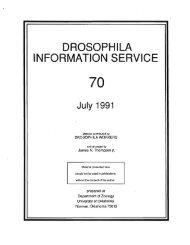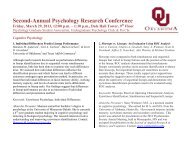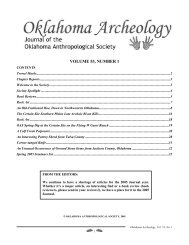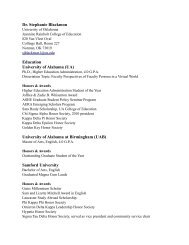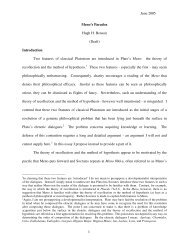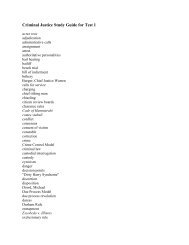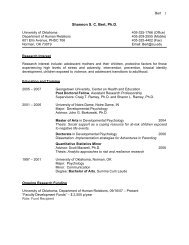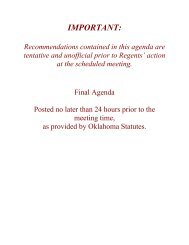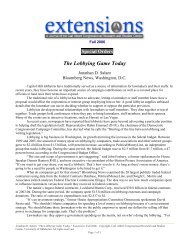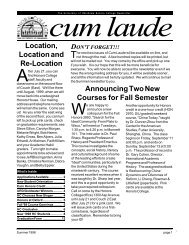11 harlem on my mind
11 harlem on my mind
11 harlem on my mind
You also want an ePaper? Increase the reach of your titles
YUMPU automatically turns print PDFs into web optimized ePapers that Google loves.
<str<strong>on</strong>g>11</str<strong>on</strong>g><br />
HARLEM ON MY MIND<br />
Er a publicity hound, there is nothing as exciting as the cover ~f<br />
the Sunday New York Times Magazine. I made it <strong>on</strong> December 8,<br />
19 68, wearing a c<strong>on</strong>servative suit, a trendy tie, and a smug grin. I<br />
was <strong>on</strong> a raised platform between the Angel of the Annunciati<strong>on</strong> and<br />
the Virgin Mary of Jacopo da P<strong>on</strong>tormo's fresco. "The Total Involvement<br />
of Thomas Hoving" was written by the art reporter Grace<br />
Glueck who, despite a few digs about <strong>my</strong> flamboyant style, called<br />
me a "multi-media extravaganza" with scholarly credentials, social<br />
c<strong>on</strong>necti<strong>on</strong>s, and a sure instinct for the box office, "eager to outwit<br />
the forces of fuddy-duddyism" with energy and "boyish candor."<br />
That candor and boyishness, the article hinted, might get me into a<br />
few scrapes, <strong>on</strong>e being the exhibiti<strong>on</strong> due to open in the new year,<br />
the cultural-photographic extravaganza, "Harlem <strong>on</strong> My Mind."<br />
I looked up<strong>on</strong> "Harlem <strong>on</strong> My Mind" as a turning point. It was<br />
going to justify <strong>my</strong> view of the museum as a moral, social, and<br />
educati<strong>on</strong>al force. Through "Harlem," the museum would pay its<br />
HARLEM ON MY MIND<br />
true cultural dues. It would chr<strong>on</strong>icle the creativity of the downtrodden<br />
blacks and, at the same time, encourage them to come to the<br />
museum.I!-expected the show to become a symbol of <strong>my</strong> fighting to<br />
persuade the museum world to get into the swiniJ<br />
A few days before the official opening in the sec<strong>on</strong>d week ofJanuary<br />
1969, I walked into the show for the first time accompanied by<br />
its creator All<strong>on</strong> Schoener and his research and design team. The<br />
exhibiti<strong>on</strong> was <strong>on</strong>e of the largest the museum had ever mounted,<br />
thirteen galleries' worth. The ensemble was more grandiose than I<br />
had imagined. Some of the photos-all black and white-had been<br />
left small, others had been blown up to life size and measured over<br />
thirty feet l<strong>on</strong>g. There were dozens of slide machines plus recorded<br />
voices, music, and the ambient sounds of people calling out to each<br />
other. There were unforgettable tracks, from Mother Brown, a<br />
ninety-year-old resident who had been born a slave, to Billie Holiday<br />
and Aretha Franklin singing famous ballads, Father Divine, Marcus<br />
Garvey, Joe Louis, dancers at the Cott<strong>on</strong> Club, Bill Robins<strong>on</strong>, MaIcolrn<br />
X.<br />
The first gallery c<strong>on</strong>tained f1oor-to-ceiling photographs of apartment<br />
buildings around 1900-the first wave of black residency. This<br />
was followed by a photo mural of C<strong>on</strong>gressman Adam Clayt<strong>on</strong> Powell's<br />
father standing in fr<strong>on</strong>t of his Abyssinian Baptist Church surrounded<br />
by the children from Sunday school. Bey<strong>on</strong>d that was a<br />
maze ofgalleries depicting the thirties. After that, the gallery spaces<br />
opened up again to a room filled with portraits of poets, writers,<br />
philosophers, musicians, artists, and ministers, many by the photographer<br />
James Van der Zee, whom I believed- to be the single most<br />
important c<strong>on</strong>tributor to the show. All<strong>on</strong> Schoener and his assistant,<br />
Reggie McGhee, had happened up<strong>on</strong> a run-down storefr<strong>on</strong>t with the<br />
sign, "Photographer, Van der Zee, Weddings, Family Gatherings,<br />
Children." They found a harried man in his seventies surrounded by<br />
dozens of cardboard boxes filled with thousands of photographs and<br />
negatives. Each was labelled by the year and identified every pers<strong>on</strong><br />
in the shot. These photos-from the twenties up to 1968-chr<strong>on</strong>icled<br />
almost every aspect of Harlem. Van der Zee specialized in portraits<br />
of jazz musicians, religious notables, and politicians. But he had also<br />
recorded hundreds of families and had invented a type of funerary<br />
photograph in which the "ghost" of the departed appeared to hover<br />
in the background. Schoener instantly recognized that he had stumbled<br />
across not <strong>on</strong>ly the backb<strong>on</strong>e of the show but <strong>on</strong>e of the coun-<br />
164
"'-:,. "."-- :;:;:'--"",;;"-,.."",.<br />
MAKING THE MUMMIES DANCE<br />
try's most important photographic archives as well. All of Van der<br />
Zee's materials would be archived and preserved. When Schoener<br />
and McGhee had wandered in off the street, Van der Zee was about<br />
to be evicted. Without doubt, they saved him for the nati<strong>on</strong>, for who<br />
knows what would have become of his possessi<strong>on</strong>s-.<br />
I found the exhibiti<strong>on</strong> powerful, somewhat shocking, beautiful in<br />
some images, disturbing in others-and unforgettable. "Harlem"<br />
was much more about culture than sociology, more about a struggle<br />
to maintain a cultural base than a racial history.<br />
"Now, if <strong>on</strong>ly the critics and the public look at this as a show<br />
instead of a political act or a multimedia event that's going to destroy<br />
the museum, then it'll be a great success," I said. And I believed<br />
"Harlem" would be a success even if a bit c<strong>on</strong>troversial. Everything<br />
about it was dynamic, especially the catalogue published by Random<br />
House for $4.95 and in a blazing red- and yellow-covered paperback<br />
versi<strong>on</strong> for <strong>on</strong>ly $1.95. "From Black to White Harlem" was the first<br />
chapter with provocative, staccato headings; "Race Riot," "Fight<br />
Against Raised Rents," or "On Better Troops in the War." "An<br />
Urban Black Culture, 1920-1929" was part two: "Landlord Brings<br />
in Negroes to Get High Rents" and "Irving Berlin Borrowed Chants<br />
from South" or "James Weld<strong>on</strong> Johns<strong>on</strong> <strong>on</strong> Anglo-Sax<strong>on</strong> Superiority."<br />
Then there was "Depressi<strong>on</strong> and Hard.Times," Then, "War,<br />
Hope, and Opportunity" followed by "Frustrati<strong>on</strong> and Ambivalence,<br />
1950-1959." The final chapter, illustrated by a portrait 'of<br />
Malcolm X, was entitled "Militancy and Identity" with headings like<br />
"Malcolm X Likens Slaying to 'Chickens Coming Home to<br />
Roost,' " or "Three Violent Days."<br />
Schoener had patterned "Harlem" after his much-acclaimed documentary<br />
history of Jewish immigrants, The Lower East Side: Portal<br />
to America.<br />
But I was deceiving <strong>my</strong>self. A series of fires were burning. I had<br />
seen the smoke and foolishly had ignored the signs of c<strong>on</strong>flagrati<strong>on</strong>.<br />
I had dismissed the growing trouble as simple "community fuss."<br />
As a member of the white, liberal establishment, <strong>on</strong>e who had<br />
emerged from the optimistic and naive Lindsay administrati<strong>on</strong>, I was<br />
mesmerized by the idea of a photographic history of Harlem at the<br />
country's most distinguished art museum.<br />
~choener was a genius, but he was also protective of "his" show<br />
and reluctant to allow outsiders to participa!flHe got into a running<br />
argument with a community firebrand by the name of Ed Taylor who<br />
100<br />
HARLEM ON MY MIND<br />
became the head of the Harlem Cultural Council. Taylor demanded<br />
ajob, was spurned by Schoener, insisted that his organizati<strong>on</strong> create<br />
the entire show, was spurned again, and after launching a host of<br />
unreas<strong>on</strong>able demands withdrew his group's support for "Harlem"<br />
vociferously. It was clear that Taylor and his cohorts wanted the<br />
show to fail. And the three community experts taken <strong>on</strong> to help in<br />
historical matters proved to be spoilers almost from the first meetings.<br />
One, the Harlem historian John Hendrick Clarke, had remarked<br />
to Schoener at their first encounter, "If you're another<br />
downtown Jew who's here to rip us off, good-bye."<br />
In the midst of the growing fracas, Ed Taylor shouted to <strong>my</strong> community<br />
affairs officer, "The crux of the whole mess is All<strong>on</strong> Schoener<br />
because he is a white man who knows nothing about Harlem. He<br />
is never available to the community; he is actively lying; he is playing<br />
off <strong>on</strong>e element against another. He does not answer letters or return<br />
ph<strong>on</strong>e calls, has made this a New York Council show, and promotes<br />
the attitude that the community should come to see him. He should<br />
be ousted. "<br />
Even McGhee and D<strong>on</strong>ald Harper, his chief researcher, who were<br />
black and well qualified, were looked up<strong>on</strong> as aliens and were dismissed<br />
as incapable of understanding the spirit of Harlem.<br />
[the black artist community rose up in fury against the show. The<br />
leaders-the painters Romare Beard<strong>on</strong> and Henri Ghent-were enraged<br />
that the first black exhibiti<strong>on</strong> in the history of the Met would<br />
c<strong>on</strong>tain no paintings.jThere were excellent reas<strong>on</strong>s for not having<br />
any works ofart, of c~urse, and in fact they would have crippled the<br />
impact of "Harlem." But <strong>on</strong>ce the fierce criticism hit the press, the<br />
show was c<strong>on</strong>demned as mere documentati<strong>on</strong> and, as <strong>on</strong>e critic cried<br />
out, "cultural cutesy-pie-ism."<br />
Another fire burning the underpinnings of "Harlem" was the<br />
school strike that exploded in the fall of 1968.It was the most vicious<br />
strike that had ever taken place in the history of New York City. The<br />
issues were tangled, and racial. When it got down to the nub, the<br />
school strike involved the bitter c<strong>on</strong>flict for c<strong>on</strong>trol of the teachers'<br />
uni<strong>on</strong> between the entrenched whites and the community blacks who<br />
wanted power and who believed they had been excluded.<br />
My true attitude was summed up in a trendy and defensive <strong>on</strong>epage<br />
foreword for the catalogue in which I c<strong>on</strong>fessed that as a privileged<br />
kid growing up in white Manhattan, Harlem was "a light-year<br />
away" and I was taught that "Negroes c<strong>on</strong>stituted a menace, a tribe<br />
<str<strong>on</strong>g>11</str<strong>on</strong>g>'."<br />
4!f!rff,<br />
-~...:':
--_._,"._-._,-~--" .._~.._--"-- _.- ~.-._-<br />
::<br />
I<br />
I'<br />
i<br />
~. ft l<br />
I<br />
MAKING THE MUMMIES DANCE<br />
that must not be allowed to come down the Avenue." I went <strong>on</strong> to<br />
say that to me, as a kid, "Negroes were people but they were happy,<br />
foot-twitching, smiling and sunny." And I embellished the truth,<br />
creating a friendly family maid, Bessie, who laughed a lot, and<br />
Frank, our chauffeur, who was bitter and silent. I stated that in those<br />
days, any c<strong>on</strong>fr<strong>on</strong>tati<strong>on</strong> <strong>on</strong> a peer basis with a Negro was "almost<br />
ludicrous," and I justified "Harlem" at the Met as a means of opening<br />
up a benevolent c<strong>on</strong>fr<strong>on</strong>tati<strong>on</strong>.<br />
When I read <strong>my</strong> embarrassing text in galleys, I asked Schoener if<br />
I could rewrite it, but he discouraged me, saying he liked the c<strong>on</strong>fessi<strong>on</strong>al<br />
t<strong>on</strong>e and especially the part about the maid and the family<br />
chauffeur. So I let the foreword go unchanged. But the real sparks<br />
came from the principal essay, written by a young black woman,<br />
Candice Van Ellis<strong>on</strong>, when she was a high school senior.<br />
Van Ellis<strong>on</strong> described the fricti<strong>on</strong>s between blacks and whites in<br />
stark terms.<br />
To Van Ellis<strong>on</strong> the most serious racial problems were caused<br />
by the c<strong>on</strong>flicts between the Jewish landlord and the black tenant.<br />
She pointed out that a large porti<strong>on</strong> of black women served as<br />
domestics in Jewish homes, which explained''the higher rate of anti<br />
Semitism am<strong>on</strong>g black women than men." She added that even the<br />
middle-class Harlem black male who had worked up the ladder in<br />
government frequently came into c<strong>on</strong>tact with Jews who had already<br />
attained higher rungs <strong>on</strong> the ladder. -<br />
Her essay ended with the chilling statement, "One other important<br />
factor worth noting is that, psychologically, blacks may find that<br />
anti-Jewish sentiments place them, for <strong>on</strong>ce, within a majority.<br />
Thus, our c<strong>on</strong>tempt for the Jew makes us feel more completely<br />
American in sharing a nati<strong>on</strong>al prejudice."<br />
I exploded to Schoener. "We can't have that sort of sentiment in<br />
this catalogue! That <strong>on</strong>e line about c<strong>on</strong>tempt for the Jew is dynamite.<br />
It's simply not true."<br />
"But it is true, Tom. These are truths. You may not like them, but<br />
they are truths," Schoener argued. "Any<strong>on</strong>e who ever worked in<br />
the civil rights movement-and I ought to know-saw the deep prejudices<br />
against Jews <strong>on</strong> the part of blacks. You cannot expunge it.<br />
Would you leave out some nasty fact-s-a horrible truth-about some<br />
painting in an exhibiti<strong>on</strong>? 'Harlem' has to have truth. I know these<br />
statements are raw, but most sociologists recognize these ugly aspects.<br />
"<br />
HARLEM ON MY MIND<br />
"I'd say t<strong>on</strong>e 'em down. Change 'em."<br />
"I'm a Jew. I'm offended-sure!-but I have to recognize these<br />
feelings are facts. Publishing these statements apparently didn't<br />
bother [Jim] Silberman of Random House. "<br />
~eluctantly, I decided I had no right to edit or censor. Yet <strong>my</strong><br />
political nerve ends were warning me that such inflammatory statements<br />
might cause a frightful row. I still didn't grasp the fierceness<br />
of what the reacti<strong>on</strong>s might b~<br />
A week before the show opened to the trustees, the Harlem community,<br />
and the press, Schoener got a call from a friend, Julius<br />
Schatz, who had just attended an "emergency" meeting of the Manhattan<br />
chapter of the American Jewish C<strong>on</strong>gress. The c<strong>on</strong>gress had<br />
obtained an advance copy ofthe Harlem catalogue and was planning<br />
to send a delegati<strong>on</strong> to Mayor Lindsay. and the City Council urging<br />
that all city funding be cut off from the museum until the catalogue<br />
was withdrawn.<br />
Schoener was frightened by the intensity of his friends' remarks.<br />
"Here I am, a member of the Jewish community-and a fairly devout<br />
<strong>on</strong>e-being called, in effect, a traitor to <strong>my</strong> race! Tom, you<br />
know city politics, would the city be able to cut off funding? How<br />
. much is it?"<br />
"Over three and a half milli<strong>on</strong> dollars," I said.<br />
"Lindsay wouldn't just cancel the m<strong>on</strong>ey, would he?" Schoener<br />
asked.<br />
"He can't. The City Council could do it. Now, you tell me, what<br />
will the c<strong>on</strong>gress do? All<strong>on</strong>, let me re<strong>mind</strong> you that I wanted that<br />
crap to come out. You c<strong>on</strong>vinced me to leave it. 'Truth,' I believe<br />
was the reas<strong>on</strong>."<br />
"Tom, I hate to say this, but I have the distinct feeling that you're<br />
no l<strong>on</strong>ger in support ofthe show. Your staff hates it and perhaps this<br />
has spilled over <strong>on</strong> you. Ever since the school strike, you've seemed<br />
distant and cold. Are you still going to support it?"<br />
"What choice do I have?" I barked.<br />
Schoener tried to reas<strong>on</strong> with the American Jewish C<strong>on</strong>gress, and<br />
it seemed to do the job. A calm settled around "Harlem <strong>on</strong> My<br />
Mind." I waited with trepidati<strong>on</strong>.<br />
The gala black-tie opening, with trustees and socialites sitting next<br />
to members of the black community, went smoothly. I had the feeling<br />
that every<strong>on</strong>e was <strong>on</strong> their best behavior. The c<strong>on</strong>versati<strong>on</strong> was<br />
tense, serious, not the usual social chit-chat. I made a toast, trying<br />
l.h~<br />
1 l (\
MAKING THE MUMMIES DANCE<br />
to bury every hatchet that had been brandished during the preparati<strong>on</strong><br />
of "Harlem." Even opp<strong>on</strong>ents made a point of coming over and<br />
c<strong>on</strong>gratulating me for <strong>my</strong> courage in mounting the show.<br />
At the press opening I was nearly assaulted. Reporters accused<br />
me of racism or of violating the sanctity of the museum. A televisi<strong>on</strong><br />
corresp<strong>on</strong>dent asked me what I thought of the "raging c<strong>on</strong>troversy"<br />
over the statements by Van Ellis<strong>on</strong>.<br />
I was exhausted and angry and had lost c<strong>on</strong>trol of <strong>my</strong>self. I made<br />
the most unfortunate statement I had ever made. I said directly to<br />
the camera, "Her statements are true. So be it."<br />
From the moment I uttered that m<strong>on</strong>umentally stupid statement, I<br />
was lost. The <strong>on</strong>ly thing that lifted <strong>my</strong> spirits that evening was the<br />
late arrival of the minister of informati<strong>on</strong> of the Black Panther Party<br />
who, al<strong>on</strong>e and unaware of the museum gossip and ideological arguments,<br />
wandered through the galleries and emerged to say "This is<br />
brilliant, and I'm going to write it up as such." I smiled wanly.<br />
I went home drained, a beaten man. Joe Noble called, his voice<br />
grim.<br />
"Tom, something terrible happened-ten paintings have been<br />
slashed. On each, some<strong>on</strong>e-an adult I think because of the height<br />
-etched into the varnish the letter H."<br />
"Which paintings?"<br />
"Ted's making an assessment-he's over there now... .'<br />
"Shall I come over?"<br />
"No need. We've got the situati<strong>on</strong> under c<strong>on</strong>trol. The <strong>on</strong>ly picture<br />
of major value according to him is the Rembrandt, Christ with a<br />
Pilgrim's Staff."<br />
"The guy carved an H?"<br />
"All very superficially. Mostly into the varnish. Ted thinks they'll<br />
all be back <strong>on</strong> view in days."<br />
I was stunned.<br />
"What do you advise?" Noble asked.<br />
"Let the Times know."<br />
"Do you think that's wise?"<br />
"Ifwe d<strong>on</strong>'t tell 'em, the guy who did it will."<br />
"Good point. "<br />
"Get Ted to call me."<br />
Rousseau was <strong>on</strong> the ph<strong>on</strong>e within minutes and reassured me that<br />
the act was more symbolism than vandalism.<br />
"What's.H?" I asked, "Harlem or Hoving?"<br />
HARLEM ON MY MIND<br />
"D<strong>on</strong>'t take it pers<strong>on</strong>ally. Be as str<strong>on</strong>g as you've been throughout<br />
all of this."<br />
Martin Arnold, the New York Times reporter from the city desk,<br />
called. His fr<strong>on</strong>t-page story would characterize me as speaking in a<br />
voice "shaking with anger."<br />
I teleph<strong>on</strong>ed Arthur Hought<strong>on</strong> to brief him. He was clearly distraught<br />
but as sympathetic as I'd ever heard him.<br />
"We knew there would be some tough times, so try to maintain<br />
your balance. I empathize with you. I have a feeling things are going<br />
to get worse. We might have to hire special guards."<br />
"Already thought of that, Arthur. I told Ted to close down half of<br />
the Paintings Department galleries and double up <strong>on</strong> the guards. I<br />
did the same with the American Paintings galleries."<br />
"Glad to see you working well under stress. I want to say that I<br />
admire you and c<strong>on</strong>tinue to support you. "<br />
Late that night, I sat down in the darkened dining room of <strong>my</strong><br />
apartment and wrote a letter of resignati<strong>on</strong> in l<strong>on</strong>ghand <strong>on</strong> a yellow<br />
pad.<br />
Fortunately, I stuck the letter in the desk drawer overnight. The<br />
next morning I read it and put it into <strong>my</strong> pers<strong>on</strong>al file, never to be<br />
shown to anybody.<br />
The members' opening started so well that I thought the chaos was<br />
over. The crowds streamed in in record numbers. Sales of the handsome<br />
catalogue were phenomenal. By the end of the day and evening,<br />
more than three thousand had been sold, more than double the<br />
sales <strong>on</strong> any day of the fresco book. But in the afterno<strong>on</strong> the blow<br />
came. Joe Feldstein, <strong>on</strong>e of John Lindsay's chief political aides,<br />
called with venom in his voice.<br />
The mayor was making a statement about the catalogue. Lindsay<br />
c<strong>on</strong>gratulated the museum for mounting the show but charged that<br />
the book accompanying the exhibiti<strong>on</strong> was inexcusably racist with a<br />
series of offensive statements about the Jewish community, the Irish<br />
community, and the Hispanic community. Lindsay called up<strong>on</strong> the<br />
trustees and me to withdraw it at <strong>on</strong>ce. Feldstein said, "My advice<br />
is to act now. Do what the Mayor wants or you're in deep shit!"<br />
"That's swell, Joe," I said. "The 'crusading liberal' John Lindsay<br />
is now into book burning and censorship?"<br />
"Come <strong>on</strong>, Tom. It's not that. This is a political thing. You were<br />
here, <strong>on</strong>ce. Try to understand."<br />
"Tell him, no withdrawal," I said. "It's the truth, what's in that<br />
170
~:::~~"'~~"'- ~- ._.-<br />
~~--~~--~-_..- ---- ~ --~...<br />
MAKING THE MUMMIES DANCE<br />
introducti<strong>on</strong>, and the truth, no matter how disgusting, cannot be<br />
covered up. Also, tell him, I'm saddened and shocked by his statement."<br />
When the Times called for <strong>my</strong> reacti<strong>on</strong> to Lindsay's words, I said,<br />
"I c<strong>on</strong>sider <strong>my</strong>self a human being of integrity, patience, and tolerance.<br />
I looked very carefully over the manuscript copy of the introducti<strong>on</strong>.<br />
I am c<strong>on</strong>vinced these statements are not racist and not<br />
bigotry and not slander. What I c<strong>on</strong>demn is the tenor of the times,<br />
which forces a young pers<strong>on</strong> who has lived in Harlem all her life to<br />
have these opini<strong>on</strong>s."<br />
All<strong>on</strong> Schoener was livid. "There was no attempt <strong>on</strong> <strong>my</strong> part to<br />
provoke anti-Semitic feelings. As a member of the New York Jewish<br />
community, I believe we mustface the realities ofthe world in which<br />
we live. Miss Van Ellis<strong>on</strong> has merely drawn attenti<strong>on</strong> to the facts."<br />
As for Candy Van Ellis<strong>on</strong>, when reached at Bridgeport College,<br />
she replied, "I d<strong>on</strong>'t see what the Mayor is mad about. What I wrote<br />
was true."<br />
The next day Dore Schary, the eminent film producer and president<br />
of the Anti-Defamati<strong>on</strong> League, c<strong>on</strong>demned the catalogue as<br />
something akin to the worst hatred ever spewed out by the Nazis.<br />
Rabbis around the city began to denounce the show, the museum,<br />
and me. Two members of the City Council were calling for a hearing<br />
-at <strong>on</strong>ce i-to c<strong>on</strong>sider halting all funds for the museum until the<br />
offensive catalogue was removed from sale.<br />
Hought<strong>on</strong> began to crack under the pressure. "That's serious,"<br />
Hought<strong>on</strong> growled at me. "Do something. And do itfast. I have the<br />
feeling, Hoving, you're <strong>on</strong> the ropes." It was the first time he had<br />
called me by <strong>my</strong> last name.<br />
"What if I can get a disclaimer from Candy Van Ellis<strong>on</strong>, stating<br />
that she never intended to be racist-we can get her statement<br />
copied up and inserted into the books," I suggested.<br />
I called Schoener and told him what I wanted. "It's to buy us a<br />
little breathing spell," I said.<br />
"It's bowing to lies, pressure. I'm totally against any sort of disclaimer.<br />
It w<strong>on</strong>'t work. It'll sound guilty, dammit! They'll never give<br />
up if you admit you're wr<strong>on</strong>g even in this small way."<br />
"All<strong>on</strong>, I'm going to do it. And as the head of the show and the<br />
editor of the catalogue, I want you to reach Candy and get the statement-by<br />
tomorrow."<br />
"This is terrible. I see our relati<strong>on</strong>ship has g<strong>on</strong>e down the drain."<br />
"I'm not thinking about a relati<strong>on</strong>ship, I'm thinking about how to<br />
HARLEM ON MY MIND<br />
save a brilliant show and a book catalogue, which happens to be<br />
selling like mad. I'm under fierce pressure from <strong>my</strong> board...."<br />
HAha!"<br />
"No, it's about the m<strong>on</strong>ey from the city. The movement to take<br />
our funding away is serious. Please ..."<br />
Schoener reluctantly complied, and Van Ellis<strong>on</strong>, a young woman<br />
of amazing good humor, said, "Sure." When the catalogues went <strong>on</strong><br />
sale the next morning, they c<strong>on</strong>tained a mimeographed insert: "The<br />
facts were organized according to the socio-ec<strong>on</strong>omic realities of<br />
Harlem at that time, and ... any racist overt<strong>on</strong>es which were inferred<br />
from the passages quoted out of c<strong>on</strong>text are regrettable."<br />
What the devil did her statement mean, I w<strong>on</strong>dered. I doubted it<br />
would work and held <strong>my</strong> breath.<br />
Opening day attendance was ten thousand-about twice the average<br />
for the opening of any temporary exhibiti<strong>on</strong> in the museum's<br />
history. The catalogue sold forty-five hundred copies. I had posted<br />
young members of the staff at the exits to listen to the comments.<br />
The visitors were clearly intrigued. Few of them seemed offended<br />
by any part of the exhibiti<strong>on</strong>. I was heartened when I heard that<br />
blacks were streaming into the show-s-something that had never<br />
happened before in the history of the Metropolitan.<br />
Still c<strong>on</strong>cerned with the city-funding issue, Arthur Hought<strong>on</strong><br />
called an emergency meeting of his top trustees plus an outsider who<br />
he said would give "invaluable advice <strong>on</strong> what to do next." The<br />
outsider turned out to be the H<strong>on</strong>. Arthur Goldberg, former Secretary<br />
of Labor under Lynd<strong>on</strong> Johns<strong>on</strong>, former justice of the Supreme<br />
Court, and at the time the ambassador to the United Nati<strong>on</strong>s and, of<br />
course, <strong>on</strong>e of the most respected Jewish leaders in the nati<strong>on</strong>.<br />
"Arthur will figure a way out of this mess you got us in," Hought<strong>on</strong><br />
said ominously.<br />
What he did was almost the opposite. Goldberg int<strong>on</strong>ed that in his<br />
view there was nothing to be gained by the "c<strong>on</strong>tinuance of offering<br />
for sale [of] the offending catalogue." As for the issue ofcensorship,<br />
he smiled an Olympian smile and suggested "the catalogue could be<br />
stored somewhere and then reissued when passi<strong>on</strong>s had subsided at<br />
no cost, to the appropriate groups." Hought<strong>on</strong> and Gilpatric seemed<br />
eager to comply, while Dick Dilworth was unc<strong>on</strong>vinced. I suggested<br />
a sec<strong>on</strong>d disclaimer from me offering an apology for using the Introducti<strong>on</strong><br />
and c<strong>on</strong>fessing that it should never have been used at all.<br />
Goldberg agreed and Hought<strong>on</strong> and Gilpatric went al<strong>on</strong>g.<br />
My apology was greeted with derisi<strong>on</strong>. There were increasing out-
.~._-<br />
._,.'-'<br />
".,,,,,_.,~~~=~~~-~"--'----<br />
MAKING THE MUMMIES DANCE<br />
cries from City Council members to "launch an ec<strong>on</strong>omic boycott<br />
against the Metropolitan." When I had told Schoener of the apology,<br />
he had accused me of mishandling all the PR and the politics. "You<br />
were God in the Parks Department with the public, the politicians,<br />
and the press, so how could you have so messed up this situati<strong>on</strong>?"<br />
he cried out. "You've lost courage. Think of me! I'm being called a<br />
traitor by <strong>my</strong> own race! I'm taking unbelievable shit because as a<br />
white pers<strong>on</strong> I'm accused of having stepped out of line in trying to<br />
do something significant about the blacks." His statement hurt because<br />
it was true.<br />
By this time I was like a bloodied boxer, reeling around the ring,<br />
incapable of protecting <strong>my</strong>self against an opp<strong>on</strong>ent who was pounding<br />
me into a pulp. The Sunday reviews began to appear and they<br />
were critical. The New York Times published a bitter editorial c<strong>on</strong>demning<br />
the show and its anti-Semitic statements.<br />
I began cancelling <strong>my</strong> appointments and holing up in <strong>my</strong> office<br />
talking <strong>on</strong>ly to <strong>my</strong> closest advisors. Harry Parker, a str<strong>on</strong>g supporter<br />
of "Harlem," was c<strong>on</strong>stantly at hand as were Ted Rousseau and<br />
George Trescher. Trescher went so far as to suggest the New York<br />
Times was in the middle of a deliberate campaign, shaped from the<br />
highest possible echel<strong>on</strong>s, to discredit "Harlem" and especially<br />
me.. He said that John Oakes, Mrs. Sulzberger and others were<br />
talking to the trustees about getting me removed and that the catalogue<br />
was <strong>on</strong>ly the symbol of what they wanted to get rid of.<br />
Trescher burst into tears. I was profoundly moved by his emoti<strong>on</strong>al<br />
c<strong>on</strong>cern.<br />
Robert Bernstein, president of Random House, let me know that<br />
he thought <strong>my</strong> acti<strong>on</strong>s <strong>on</strong> the disclaimers and the apology were<br />
"str<strong>on</strong>g and correct." Random House had no intenti<strong>on</strong> at that time<br />
of withdrawing the book from sale, he added. But, as it turned out,<br />
Random House was not saying the same thing to All<strong>on</strong> Schoener.<br />
Bennett Cerf', the celebrity chairman of Random House-he was<br />
a fixture <strong>on</strong> the popular televisi<strong>on</strong> quiz show What's My Line?-and<br />
Bernstein, who had a distinguished record fighting for civil rights all<br />
over the world, had called Schoener to task, asking him to issue a<br />
pers<strong>on</strong>al apology for the catalogue. Schoener had refused. The publishing<br />
executives had informed Schoener that under the c<strong>on</strong>tinuing<br />
and increasing pressure from the Jewish community, they might not<br />
be able to hold out much l<strong>on</strong>ger <strong>on</strong> withdrawing the book. Schoener<br />
said flatly, "But that would be book-burning." Cerf, incensed, shak-<br />
HARLEM ON MY MIND<br />
ing all over, thrust his finger towards Schoener's face and shouted,<br />
"Do you know what you have d<strong>on</strong>e to Random House?"<br />
The attacks increased. The Jewish Defense League, headed by the<br />
radical Zi<strong>on</strong>ist, Meir Kahane, picketed the museum. At times thousands<br />
of protesters brought Fifth Avenue traffic to a crawl. More<br />
rabbis and more politicians jumped into the fray.<br />
Hought<strong>on</strong> called. "Some of the trustees are angry," he said.<br />
"Francis Plimpt<strong>on</strong> is pressuring me to have a board discussi<strong>on</strong> of<br />
how we got into this mess and why you didn't sufficiently brief us <strong>on</strong><br />
what the Harlem debacle was going to be. I'll have the meeting of<br />
course. There may be a closed sessi<strong>on</strong> at which you-and all exofficios-will<br />
be asked to leave the room. If so, I'll leave with you.<br />
Hell, ifneed be, I'll walk out thefr<strong>on</strong>t steps with you, hand in hand."<br />
"That means a lot, Arthur," I told him.<br />
Suddenly, the news broke that the new regime in Iraq, headed by<br />
Saddam Hussein, had hanged fourteen men-nine of them Jewsfor<br />
spying. The pickets surged down Fifth Avenue to the Iraqi c<strong>on</strong>sulate,<br />
then located <strong>on</strong> 79th Street just off the avenue, pausing to<br />
vilify the Met <strong>on</strong> the way. On Thursday, January 30, twelve of the<br />
more prominent members of the City Council issued a resoluti<strong>on</strong><br />
requesting the immediate withdrawal of the catalogue and the withholding<br />
of city funding until such time.<br />
When that news hit, Arthur Hought<strong>on</strong> called me at home. When<br />
especially disturbed, he became exaggeratedly polite. When he<br />
asked me to join him for a "simple desk lunch" down at Steuben<br />
and I saw how magisterial he was acting, I knew something grave<br />
was about to happen.<br />
We chit-chatted about details of the museum, in an elaborate and<br />
leisurely manner. Then, almost as an aside, Hought<strong>on</strong> said, "Tom,<br />
the catalogue's finished. We feel that Unless we withdraw it, the<br />
museum will suffer financially to a degree that we might never recover.<br />
Think of the c<strong>on</strong>sequences of no city m<strong>on</strong>ey. Somewhere<br />
we'll have to raise three and a half milli<strong>on</strong> additi<strong>on</strong>al funds a year. I<br />
think the museum's current state of affairs is not, ah, c<strong>on</strong>ducive for<br />
the raising offunds-the Jewish community being some of our more<br />
valiant m<strong>on</strong>etary supporters."<br />
I found it was difficult to speak calmly to the arch patrician who<br />
was, so airily, defending censorship and what amounted to bookburning.<br />
All I could manage was, "The resoluti<strong>on</strong> w<strong>on</strong>'t make it out<br />
of committee."<br />
174
----<br />
17'<br />
MAKING THE MUMMIES DANCE<br />
"That's not the point. The mayor's calling for the withdrawal<br />
more forcibly every day. They mean to take our m<strong>on</strong>eys and they'll<br />
do it," Hought<strong>on</strong> said.<br />
"Give me a little time ... at leastto explain this to the staff...."<br />
"No. Tom. This is a directive from the officers of the museum. It<br />
must be d<strong>on</strong>e. Now."<br />
I walked back from Steuben at 56th Street and Fifth Avenue to the<br />
museum, feeling more depressed than at any time in <strong>my</strong> professi<strong>on</strong>al<br />
life. I cursed Lindsay as a political hack and cursed the bad luck of<br />
the show and the critics for having inflamed insignificant issues. But<br />
by the time I got to <strong>my</strong> office, I had caved. Perhaps I should have<br />
told Hought<strong>on</strong> to issue the order himself and then quit. But there<br />
was no place to go. I was too exhausted to fight back.<br />
The next day, just after we had sent out a press release about the<br />
withdrawal of the catalogue, Mort Lawrence, the intense, darkhaired,<br />
gravel-voiced publisher of a local newspaper, Park East,<br />
teleph<strong>on</strong>ed to say that he'd made a major discovery about "Harlem."<br />
I told him to come right over.<br />
"Tom, Candice Van Ellis<strong>on</strong>'s essay was almost totally changed<br />
by Schoener," he said. "All the inflammatory statements are not<br />
hers. They come from Patrick Moynihan and Nathan Glazer's book,<br />
Bey<strong>on</strong>d the Melting Pot. Van Ellis<strong>on</strong> cited these quotes in footnotes<br />
in her essay. They appear in quotes. Schoener removed those.<br />
quotes, cut out the footnotes, and paraphrased the stuff to make it<br />
sound dramatic. To make it seem she had written it."<br />
I stared at him dumbfounded.<br />
"What I'm saying is that the original text from which the c<strong>on</strong>troversial<br />
stuff is derived gives full credit to the various research resources<br />
used by the student, but in editing it, Schoener took out the<br />
quotati<strong>on</strong> marks and attributi<strong>on</strong>s, so that the introducti<strong>on</strong> appears to<br />
c<strong>on</strong>tain <strong>on</strong>ly Van Ellis<strong>on</strong>'s original thoughts <strong>on</strong> race relati<strong>on</strong>s."<br />
Lawrence laid out <strong>on</strong> <strong>my</strong> desk the Introducti<strong>on</strong>, a copy of Van<br />
Ellis<strong>on</strong>'s original essay, and Glazer and Moynihan's Bey<strong>on</strong>d the<br />
Melting Pot.<br />
"I can't believe it, but it's true, isn't it?" I said dumbly.<br />
"You know, to me the funny thing is that we, the tiny staff of Park<br />
East, found this. Not the mighty New York Times."<br />
"Maybe they didn't want to," I said.<br />
When I called Hought<strong>on</strong>, I said, "We can announce this and go<br />
<strong>on</strong> selling the catalogue." His resp<strong>on</strong>se was, "My reacti<strong>on</strong> is that a<br />
HARLEM ON MY MIND<br />
completely flawed Introducti<strong>on</strong> makes it even more proper that we<br />
withdraw. "<br />
The c<strong>on</strong>fr<strong>on</strong>tati<strong>on</strong> I had with All<strong>on</strong> Schoener the next day about<br />
the discrepancies started off with acrim<strong>on</strong>y but ended with mutual<br />
expressi<strong>on</strong>s offrustrati<strong>on</strong> and anger, towards others, not each other.<br />
"Why, as a professi<strong>on</strong>al editor, did you do it?" I demanded.<br />
"I didn't want the thing to sound like just a high school essay,"<br />
he said.<br />
"It's your fault. If you had let it al<strong>on</strong>e, we'd be still selling those<br />
books. "<br />
"I d<strong>on</strong>'t think so. You gave in too quickly. You succumbed to the<br />
museum board-the pols, the lawyers, the real racists. I have to tell<br />
you that your acti<strong>on</strong> in putting out that dumb disclaimer and that<br />
dumb apology and then going al<strong>on</strong>g with the book-burning and then<br />
locking those catalogues into the cellar here is disgraceful. I thought<br />
a lot more of you. I used to admire you."<br />
"Come off it, All<strong>on</strong>. We've both screwed up. So, I caved. The<br />
events were too much for us. I still think the show's brilliant, and I<br />
think in some years I'll look back <strong>on</strong> this as a major breakthrough.<br />
We're going to make it."<br />
"You'll make it," he said. "They'll have to keep you. It would be<br />
too embarrassing to throw you out so early. But I'm ruined. I d<strong>on</strong>'t<br />
know what to do. I'm called a terrorist and a traitor by <strong>my</strong> own<br />
people."<br />
All<strong>on</strong> Schoener eventually moved to Graft<strong>on</strong>, Verm<strong>on</strong>t, and established<br />
a c<strong>on</strong>sulting and free-lance writing career. Except for necessary<br />
meetings, he has never returned to live in New York City.<br />
The executive committee of the board of trustees met in February.<br />
For the first time since I arrived, there was no rehearsal beforehand.<br />
Hought<strong>on</strong> raced through the normal agenda, spending a mere fifteen<br />
minutes <strong>on</strong> what normally would have taken an hour. When he was<br />
finished, he turned to me and said, "Tom, a few trustees have some<br />
questi<strong>on</strong>s c<strong>on</strong>cerning the recent events and your c<strong>on</strong>duct recently. I<br />
would like to ask the vice-directors and the treasurer to leave the<br />
chamber."<br />
I had expected a closed sessi<strong>on</strong> but had assumed that it would<br />
remain parliamentary. I was wr<strong>on</strong>g. The first cries of outrage came<br />
from Francis Plimpt<strong>on</strong>.<br />
His words came out in a flood, but I hastily wrote down memorable<br />
phrases: "Never seen suchan instituti<strong>on</strong>al disaster"; "annihila-
-~~ ------<br />
, 't c<br />
- -_~__~c~<br />
_<br />
MAKING THE MUMMIES DANCE<br />
ti<strong>on</strong>"; "a museum wrecked by foolhardy acti<strong>on</strong>s"; "failure that will<br />
blot your record forever. "<br />
I was calm. In a curious way, I welcomed the attack. I made<br />
<strong>my</strong>self look unruffled and acted as if I were taking serious notes <strong>on</strong><br />
Plimpt<strong>on</strong>'s diatribe. I glanced at Hought<strong>on</strong> whose face was very<br />
pale. A good sign. That meant he hadn't orchestrated Plimpt<strong>on</strong>.<br />
Elderly, white-maned Devereux C. Josephs, the chairman of New<br />
York Life Insurance Company, and a close friend of <strong>my</strong> father-inlaw,<br />
was next.<br />
"I agree with <strong>my</strong> colleague, Francis Plimpt<strong>on</strong>," Josephs said.<br />
"Mr. Hoving, you have d<strong>on</strong>e a great disservice to your instituti<strong>on</strong>. I<br />
have, Mr. President, a questi<strong>on</strong>, namely, how many so-called exhibiti<strong>on</strong>s<br />
of social progress, 'relevancy,' and 'practical life' is our impetuous<br />
director going to commit us to, without allowing us the<br />
courtesy ofknowing anything about his secretive plans? Also, I want<br />
to know how much more trouble is this director going to get us<br />
into?"<br />
I decided to ignore Plimpt<strong>on</strong>. From <strong>my</strong> political experience, I had<br />
learned always to answer the last pers<strong>on</strong>. The point was to answer<br />
the enemies as if you were talking to your friends-softly, rati<strong>on</strong>ally,<br />
and insistently-and I saw that I still had some allies <strong>on</strong> that board.<br />
"Mr. Josephs, I have brought, of course; a list of the times-there<br />
are six separate times-when I fully briefed either Arthur Hought<strong>on</strong><br />
or an officer of the board or the executive committee officially of the<br />
progress and the problems of 'Harlem.'<br />
"To answer your questi<strong>on</strong>, Mr. Josephs, about how much trouble<br />
I'm going to cause in the future. Probably a lot. You know why?<br />
This museum's still in a deep quagmire. Getting out isn't going to<br />
please a lot of you or the outside public or the art press. But you've<br />
got to allow this instituti<strong>on</strong> to extricate itself from the mire and get<br />
moving. A few steps have been taken. The women's issue is <strong>on</strong> the<br />
way to soluti<strong>on</strong>. The accounting system is starting to get straightened<br />
out. We have the beginnings of a career and salary plan in the works.<br />
A worthy management study. Even a fund-raising plan. The Centennial's<br />
going to be a landmark. The fresco show was a moment of<br />
history. We are creating a master architectural plan-the first in our<br />
history. The public is streaming in. The membership is up, despite<br />
the defecti<strong>on</strong>s from 'Harlem'-and they'll be back. The uni<strong>on</strong>s are<br />
quiet. More m<strong>on</strong>ey has been raised since I arrived than in the previous<br />
twenty years of this place. Kings ... The Terrace ... The<br />
HARLEM ON MY MIND<br />
Musical Instruments. When I met your Search Committee I told<br />
them ... what did I tell you, Frank?" I said, turning to the chairman,<br />
Frank Rogers.<br />
"That there'd be some turmoil," he said.<br />
"Yes, turmoil. I spelled it all out. When I gave that speech to the<br />
AAM, which so many of you came up to praise me for, I spoke of<br />
'relevancy' and activity and criticism, lawsuits and some bad press.<br />
It's going to happen. You cannot avoid it. I have g<strong>on</strong>e out of <strong>my</strong> way<br />
to let you know everything-those of you who have intrinsic interest<br />
in the Met and who want to be a part of this revoluti<strong>on</strong>. I admit to<br />
blunders-lots-involving 'Harlem.' So what? It's <strong>on</strong>e effort out of<br />
hundreds we'll do. Will the exhibiti<strong>on</strong> schedule include dozens of<br />
'social shows'? Not if I can help it. Relax. This is a l<strong>on</strong>g pull. At<br />
times it's going to get rougher. Wait till we start expanding into the<br />
park. But I never failed to tell any ofyou, those who cared, what the<br />
hell was up or coming up. And I w<strong>on</strong>'t fail to do that in the future.<br />
Listen. I sat here-what?-a year and a half ago and watched as <strong>on</strong>e<br />
of your distinguished body virtually tore apart <strong>my</strong> predecessor. I get<br />
some of that feeling now. And I d<strong>on</strong>'t need that. Do I make <strong>my</strong>self<br />
clear? I love this instituti<strong>on</strong>. I'll try <strong>my</strong> damnedest to make it greater.<br />
I shall make <strong>my</strong> share of mistakes. You must understand that. And,<br />
of course, so will you."<br />
Silence. For the first time since I'd met him, Arthur Hought<strong>on</strong><br />
looked flustered. But in a few sec<strong>on</strong>ds he said, "Well, are there any<br />
more questi<strong>on</strong>s or comments? Well, hearing n<strong>on</strong>e, I suggest that ...<br />
and I hope you understand this, Tom ... I suggest an executive<br />
sessi<strong>on</strong> of the full board-ah, Tom, can you leave?"<br />
"Good idea," I said breezily and shot Hought<strong>on</strong> a look of pure<br />
acrim<strong>on</strong>y. This was the man who said we would walk out of the<br />
room and down the steps of the museum, "hand in hand." He<br />
avoided <strong>my</strong> eyes.<br />
I p<strong>on</strong>dered whether to go home or to stay in <strong>my</strong> office until the<br />
executive sessi<strong>on</strong> was over. I decided <strong>on</strong> the latter, figuring that after<br />
<strong>my</strong> performance, the board could not possibly fire me. I left slightly<br />
ajar the door of <strong>my</strong> office leading to the corridor through which the<br />
board members had to leave the museum, hoping that Hought<strong>on</strong><br />
would stop in to tell me what had happened. He did.<br />
"Tom ... I suppose they've had meetings at the Met like that<br />
before. Now, your remarks defused a possibly ugly turn of events.<br />
There has been a board resoluti<strong>on</strong>. Brooke proposed it. We have
MAKING THE MUMMIES DANCE<br />
created a subcommittee, which makes it an advisory body <strong>on</strong>ly,<br />
through which you can inform the board and its official committees<br />
<strong>on</strong> forthcoming exhibiti<strong>on</strong>s...."<br />
"A sock in the face," I said angrily.<br />
"Call it a slap <strong>on</strong> the wrist," Hought<strong>on</strong> said with a tight smile.<br />
"No way, Arthur. You brief 'em. I'll tell you, as I always have,<br />
about the upcoming shows. But I will not submit to a bunch of<br />
amateurs. Okay? And, what about this talk of yours of walking out<br />
with me 'hand in hand'? Thanks. Look, I'll work with you. I'll deliver<br />
the Centennial. But from now <strong>on</strong>, it's different. No <strong>on</strong>e sells me<br />
out. Just keep that exhibiti<strong>on</strong> subcommittee off <strong>my</strong> back."<br />
That evening our relati<strong>on</strong>ship ended. Hought<strong>on</strong> was to c<strong>on</strong>tinue<br />
<strong>on</strong> as chairman for another year and a half, throughout the Centennial<br />
he had so imaginatively and courageously champi<strong>on</strong>ed. But from<br />
that evening until his abrupt retirement from the board, Hought<strong>on</strong><br />
had given up. I suppose he saw that I was not to be dislodged. And<br />
what if he had engineered <strong>my</strong> ouster that evening (which he could<br />
have d<strong>on</strong>e)? I can <strong>on</strong>ly imagine that Arthur Hought<strong>on</strong>, faced with<br />
the prospect of another lengthy search for a director, had himself<br />
caved.<br />
Wounded, occasi<strong>on</strong>ally hounded by the aftereffects of the disastrous<br />
"Harlem <strong>on</strong> My Mind," I needed weeks to recover from bouts<br />
of depressi<strong>on</strong> and self-doubt. What the hell had we achieved, I kept<br />
asking <strong>my</strong>self. After a while I saw that we had achieved a great deal.<br />
We had identified and possibly saved for posterity the works of a<br />
talented photographer, James Van der Zee. Blacks have never<br />
stopped coming to the Met. Eventually Arnold Johns<strong>on</strong>, <strong>on</strong>e of the<br />
str<strong>on</strong>gest Harlem supporters of the show, was voted a member of<br />
the board of trustees. I never heard another word from either Francis<br />
Plimpt<strong>on</strong> or Devereux Josephs. The infamous catalogue went underground<br />
in a storage bin in the museum but was doled out-every<br />
single <strong>on</strong>e ofits fifteen thousand copies-to black school groups and<br />
individuals. Years later, the Schomburg Library accepted with<br />
thanks all the Harlem photo murals, which can be seen there today.<br />
1HO<br />
12<br />
INEED ACOUP TO<br />
SURVIVEI<br />
I _",d to hid, how deeply affected I was by the failure. Barely<br />
It was the worst disappointment I had ever suffered in <strong>my</strong> life, and I<br />
had brought it <strong>on</strong> <strong>my</strong>self. At the least I had made it worse. I fell into<br />
a miasma of self-pity and felt I might almost be having a nervous<br />
breakdown. I railed at the press to <strong>my</strong> wife. I employed the classic<br />
excuses: they had built me up, just to tear me down, even destroy<br />
me. It was n<strong>on</strong>sense, of course. I had blundered. I had been inept<br />
and stupid. My c<strong>on</strong>fidence was shaken and I could not seem to<br />
regain it.<br />
I have never had close friends, and in <strong>my</strong> ag<strong>on</strong>y I found I had no<br />
<strong>on</strong>e to turn to for solace except Nancy. And I needed an outside<br />
friend. It was Ted Rousseau who took charge of me and saved me.<br />
One day, Ted came to <strong>my</strong> office and literally ordered me to have<br />
lunch with him. He came directly to the point.<br />
Ted had spoken to "key trustees" and had found out that <strong>my</strong><br />
survival was "perilous." Of course I knew that the leaders of the



